
- Family name: Rosaceae
- Host plant for: Red-Spotted Purple (Basilarchia arthemis astyanax) and Eastern Tiger Swallowtail (Papilio glaucus)
- General description: Deciduous tree with glossy, alternate leaves, and elongated, somewhat drooping clusters of small white flowers. Dark purple fruit attractive to birds. Easy to cultivate and extremely fast growing. Readily self-seeds and can be somewhat weedy. Provides year-round interest with scaly reddish bark, spring flowers, summer fruit, and yellow fall color. Underused in home landscapes. Can make attractive specimen or shade tree. Flowers attract butterflies and other pollinators.
- Type: Deciduous tree
- Flower: Elongated, somewhat drooping clusters of small white flowers in elongated clusters
- Bloom time: Spring
- Soil type: Moist, well-drained soils
- Maximum height: 50 feet
- Candidate for home gardens: Fast growing, attractive bark, glossy leaves and spring flowers
- Availability in nursery: Limited primarily to native plant nurseries
- Frequency in the wild: Common
- Habitat: Upland mixed forests, open hammocks, river corridors, woodland clearings, fencerows, disturbed areas sandhills, hardwood forests, ruderal
- Range in Florida
 The Florida Wildflowers & Butterflies projects at the Florida Museum are sponsored in part by the State of Florida and the Florida Wildflower Foundation, Inc.
The Florida Wildflowers & Butterflies projects at the Florida Museum are sponsored in part by the State of Florida and the Florida Wildflower Foundation, Inc.